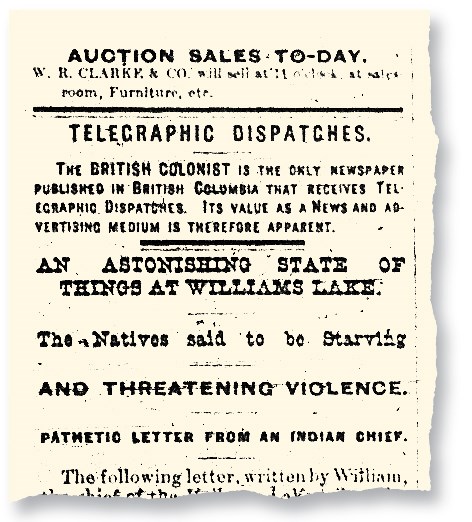A 135-year-old letter to the editor in the Daily British Colonist was a key piece of evidence in a favourable ruling for a B.C. First Nation in a long-standing land claim last week.
The letter, from Chief William of the Williams Lake Indian Band, was published in the Nov. 7, 1879, Daily British Colonist, which later became the Times Colonist, with an editorial urging readers to “settle the land question for Indians and to give them a small portion of their own vast domain on which they may live in peace.”
In the letter, Chief William wrote:
“I am an Indian chief and my people are threatened by starvation. The white men have taken all the land and all the fish. A vast country was ours. It is all gone. ...The land on which my people lived for five hundred years was taken by a white man; he has piles of wheat and herds of cattle. We have nothing — not an acre. Another white man has enclosed the graves in which the ashes of our fathers rest, and we may live to see their bones turned over by the plough.”
In a ruling by the independent federal tribunal called the Specific Claims Tribunal, Judge Harry Slade used the letter as well as historical documents and notes as evidence the colony did not meet its obligations to the First Nation. The dispute, over parcels of land including downtown Williams Lake, has been ongoing since 1861.
“This is a victory for us and I hope the federal government honours the decision,” said Williams Lake Chief Ann Louie. If the government does not appeal, the claim moves to the settlement compensation stage.
Louie cited historical knowledge passed on from elders and Chief William’s meticulous records as crucial in the case.
John Lutz, a history professor at the University of Victoria who specializes in aboriginal and settler relations, said it’s rare to have documents from First Nations of this era. Many relied on oral traditions and were learning to speak and write in English.
He said this is why the digitized copies of the British Colonist, which served the entire province, are likely to be an extraordinary resource in ongoing disputes.
“This is a game-changer in historical research in B.C.,” said Lutz, who has used the online archive to find evidence for another land claim.
“Now that the British Colonist is archived online, I think we will find all sorts of revelations. Before it would have taken a lifetime to find anything.”
The British Colonist was founded in 1858 by Amor de Cosmos. It was later known as the Daily British Colonist and the Daily Colonist before merging with the Victoria Times in 1980 and becoming the Times Colonist.
Digitization of the early newspaper started with a 2008 project involving the Times Colonist, UVic and other partners in honour of the 150th year of the newspaper.
Lutz said the digital collection is especially important in terms of aboriginal land title and understanding how First Nations and their allies — albeit few in the late 1800s — have long spoken out against their treatment by colonists.
“This letter is proof they did speak out even though there were very few ways for them to express discontent,” Lutz said.
British Columbia still has a lot of work to do in terms of reconciliation and settling land claims, he said. “We’ve put the onus on First Nations but really there has to be equal onus on settler British Columbians to understand the historical evidence and status.”
> Text of Chief William’s letter, A9
> Browse the British Colonist 1858-1920 at britishcolonist.ca



